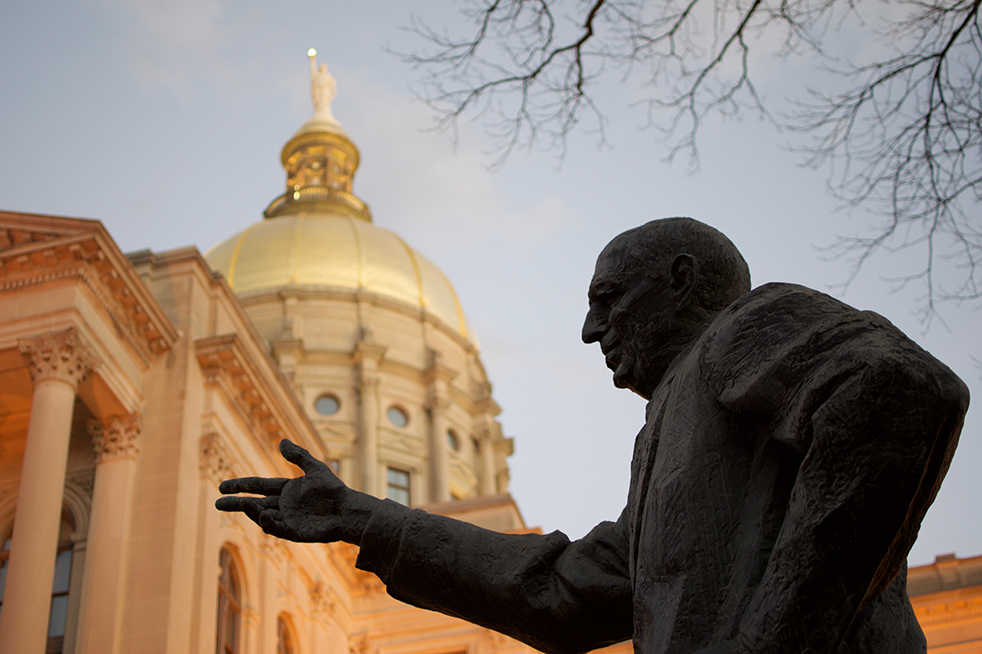With a new year comes a new legislative session, and with that session comes legislative priorities for the Institute and the University System of Georgia (USG). The legislative session, the second of Georgia’s 154th General Assembly, began on Jan. 8 and is scheduled to conclude after 40 legislative days.
Tech has two main priorities for the session. Both relate to securing funding for building projects on campus. The first is to get $30.6 million for the Price Gilbert Library/Crossland Tower renewal project. This funding is for the second phase of the project; the first phase is already underway after the $47.4 million state allocation in this past fiscal year.
To leverage state funding, the Institute will be putting $9.1 million into the project in addition to what the state provides. Currently, the project is on track to enter its second phase, the renewal of Price Gilbert Library, by the beginning of 2019.
The second project is for $5 million for the Georgia Advanced Biomanufacturing Center, a project aimed at creating next-generation therapies. The money is specifically to provide a Tech-led research team with equipment needed for their research. The project itself is a collaboration between Georgia’s universities and industries working with the production of therapies using
living cells.
The USG also has two main priorities, which relate more to general funds rather than specific projects. The first is $51.1 million in new funds that will go towards enrollment growth. The money would support day-to-day operations and would be shared among all USG institutions.
The second fund for which USG is asking for money is the Major Repair and Rehabilitation Fund. This fund is designed to repair aging facilities across all USG. The money is specifically directed toward resolving more than $100 million in deferred maintenance needs.
Beyond the asks for funding being brought forth by Tech and USG, there are many important topics that will be under discussion in this session. The first is an adoption bill that would look to bring Georgia’s adoption laws up to a more modern standard. Critics of the bill are worried about language that would make it more difficult for LGBT community to adopt children in the state of Georgia. Gov. Nathan Deal has therefore called for the bill to pass without language similar to that of the “religious freedom” bill that Gov. Deal vetoed in 2016.
Discussions about a new healthcare bill are also taking place this session. Specifically, there are talks about expanding Medicaid in order to have access to more federal health care dollars. The expanded funds would then be used on high need populations such as substance abusers.
Additionally, bills have already been submitted in both the house and the senate regarding relocation of Confederate monuments. The bills would give control over relocation of monuments to local governments, but House Speaker David Ralston has said that the issue should be left to the state, meaning these bills would most likely not pass.
Smaller bills that have already been submitted and are on the docket include: only hands-free phone calls can be conducted by drivers (HB 7), raising the age of mandatory education to 17 (HB 26) and a ban on smoking in a motor vehicle with a minor (HB 18).
Finally, this session will most likely include discussion on mass transit, specifically within Atlanta. The House Commission on Transit Governance and Funding has yet to release any recommendations on the issue, but with increasing pressure to attract businesses like Amazon they will most likely comment sooner rather than later.
One final issue that may arise this session is the fact that both Gov. Deal and Lt. Gov. Casey Cagle are not up for election for their current positions.
Cagle, along with some of his fellow senators, will be running for higher office later this year, something that may delay some bills from passing. In addition, the midterm elections taking place this year mean that all executive positions are up for election, and all fourteen of Georgia’s seats in the United States House of Representatives are up for election. These elections may cause delays as current senators and representatives may be campaigning.
